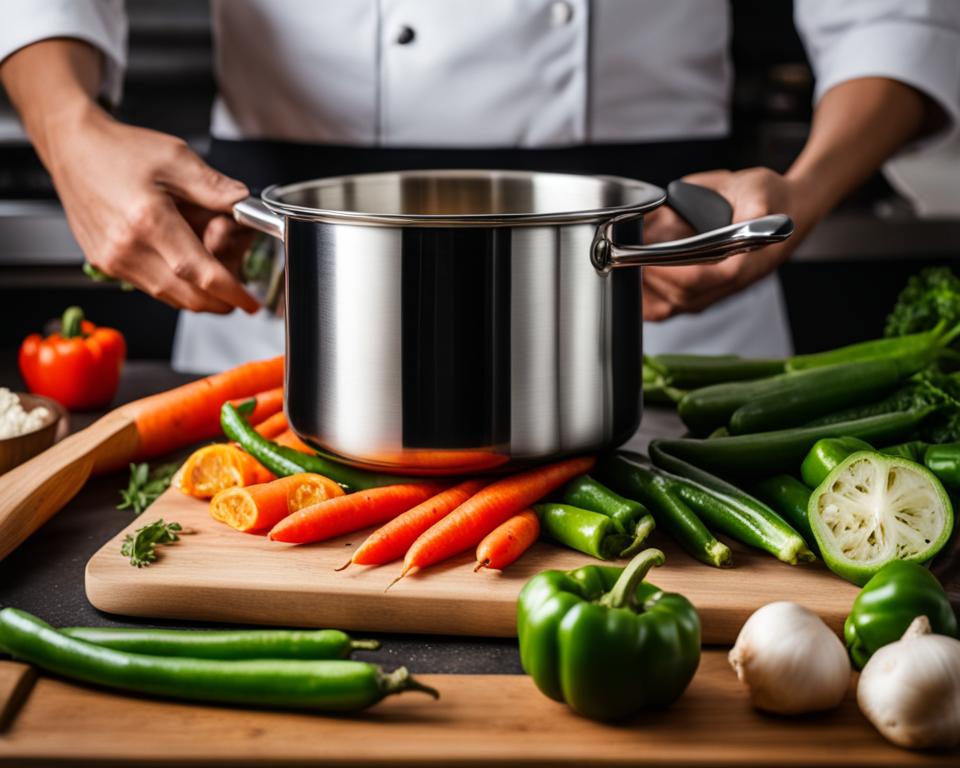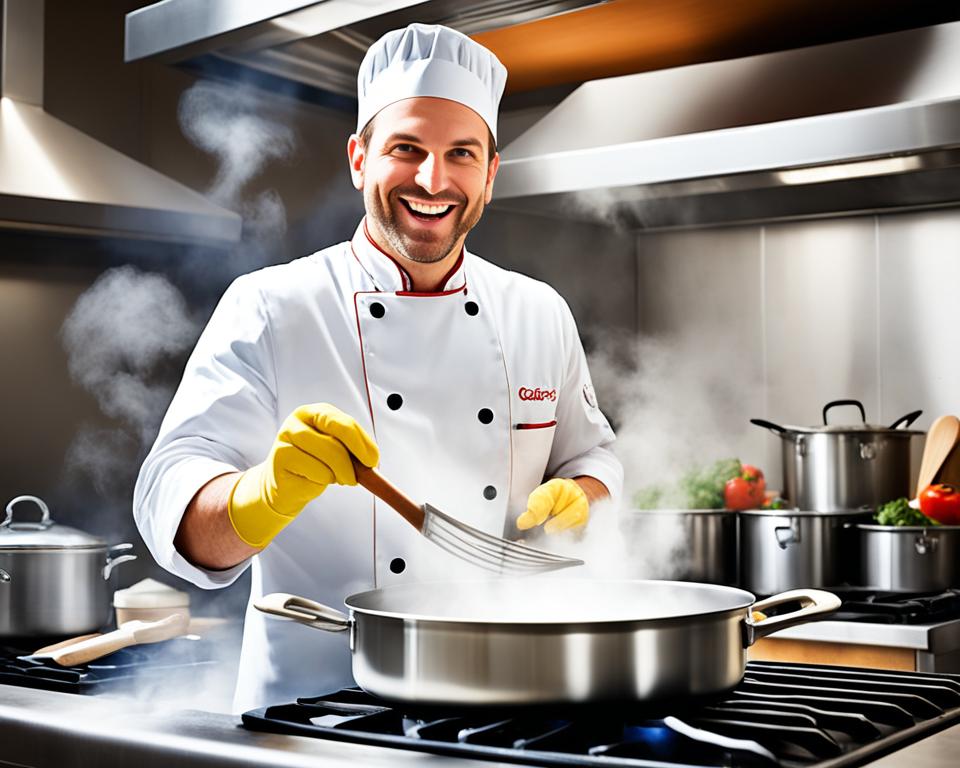Introduction
Everyday cookware is the basic set of pots, pans, and utensils that you need to cook everyday meals. It typically includes a saucepan, a frying pan, a baking dish, a casserole dish, and a set of utensils. Everyday cookware is designed to be durable and versatile, so that you can use it to cook a variety of dishes.
II. Benefits of using everyday cookware
There are many benefits to using everyday cookware, including:
- It is affordable. Everyday cookware is typically less expensive than specialty cookware.
- It is versatile. Everyday cookware can be used for a variety of cooking tasks, from boiling water to searing meat.
- It is durable. Everyday cookware is made from sturdy materials that can withstand everyday use.
- It is easy to clean. Everyday cookware is typically easy to clean, even if it is made from non-stick materials.
Overall, everyday cookware is a great option for people who are looking for affordable, versatile, durable, and easy-to-clean cookware.
III. Types of everyday cookware
There are many different types of everyday cookware available on the market, each with its own unique set of features and benefits. Some of the most common types of everyday cookware include:
* **Stainless steel cookware:** Stainless steel is a durable and versatile material that is resistant to corrosion and stains. Stainless steel cookware is also heat-resistant and can be used on all types of cooktops, including gas, electric, and induction.
* **Aluminum cookware:** Aluminum is a lightweight and affordable material that heats up quickly and evenly. Aluminum cookware is also relatively non-stick, making it easy to clean. However, aluminum cookware can be prone to scratches and dents.
* **Cast iron cookware:** Cast iron is a heavy and durable material that heats up slowly and evenly. Cast iron cookware is also very versatile and can be used for a variety of cooking methods, including searing, baking, and roasting. However, cast iron cookware can be difficult to clean and maintain.
* **Copper cookware:** Copper is a highly conductive material that heats up quickly and evenly. Copper cookware is also very durable and can last for many years. However, copper cookware is expensive and requires special care to prevent it from tarnishing.
* **Non-stick cookware:** Non-stick cookware is coated with a special material that prevents food from sticking to the pan. Non-stick cookware is easy to clean and maintain, but it can be more expensive than other types of cookware.
When choosing the right type of everyday cookware, it is important to consider the following factors:
* **Your cooking needs:** What types of foods do you typically cook? How often do you cook?
* **Your budget:** How much are you willing to spend on cookware?
* **Your lifestyle:** Do you have a lot of time to cook? Do you have a dishwasher?
By considering these factors, you can choose the best type of everyday cookware for your needs.
III. Types of everyday cookware
There are many different types of everyday cookware available on the market, each with its own unique set of features and benefits. Some of the most common types of everyday cookware include:
- Stainless steel cookware
- Aluminum cookware
- Cast iron cookware
- Copper cookware
- Nonstick cookware
Each type of cookware has its own advantages and disadvantages, so it is important to choose the type that is best suited for your needs. For example, stainless steel cookware is durable and versatile, but it can be more expensive than other types of cookware. Aluminum cookware is lightweight and affordable, but it can be prone to warping and scratching. Cast iron cookware is durable and heat-resistant, but it requires more care and maintenance than other types of cookware. Copper cookware is beautiful and conducts heat evenly, but it is also expensive and requires special care. Nonstick cookware is easy to clean and use, but it can be more expensive than other types of cookware and it can also release harmful chemicals when heated.
V. Everyday cookware recipes
Here are some everyday cookware recipes that you can try:
* **Easy weeknight dinners:**
* **One-pot pasta with vegetables**
* **Sheet pan chicken fajitas**
* **Slow cooker chili**
* **Taco soup**
* **Quick and easy breakfasts:**
* **Oatmeal with fruit and nuts**
* **Pancakes with eggs and bacon**
* **French toast**
* **Yogurt parfait with fruit and granola**
* **Budget-friendly lunches:**
* **Salad with grilled chicken or tofu**
* **Sandwiches with deli meat and cheese**
* **Soup**
* **Pasta with tomato sauce**
* **Healthy and nutritious dinners:**
* **Salmon with roasted vegetables**
* **Chicken stir-fry with brown rice**
* **Tofu tacos with vegetables**
* **Vegetarian chili**
These are just a few examples of the many everyday cookware recipes that you can try. With a little creativity, you can easily create delicious and healthy meals using the cookware that you already have in your kitchen.
VI. Tips for using everyday cookware
Here are some tips for using everyday cookware:
- Use the right cookware for the job. Not all cookware is created equal, so it’s important to use the right type of cookware for the specific task you’re trying to accomplish. For example, you wouldn’t want to use a nonstick skillet to sear a steak, as the steak would stick to the pan.
- Preheat your cookware before adding food. This will help to prevent sticking and ensure that your food cooks evenly.
- Use low to medium heat when cooking. High heat can cause food to burn and can also damage your cookware.
- Don’t overcrowd your cookware. This will prevent your food from cooking evenly and can also cause it to boil over.
- Don’t use metal utensils on nonstick cookware. This can damage the coating and make it difficult to clean.
- Clean your cookware after each use. This will help to prevent food from sticking and will extend the life of your cookware.
VII. Cleaning and maintaining everyday cookware
Cleaning and maintaining your everyday cookware is important to ensure that it lasts for years to come. Here are a few tips for cleaning and maintaining your cookware:
* **Wash your cookware after each use.** This will help to prevent food from sticking and burning, and it will also help to prevent the growth of bacteria.
* **Use a mild detergent and warm water.** Harsh detergents can damage the finish of your cookware, so it’s important to use a mild detergent and warm water.
* **Avoid using abrasive cleaners or scouring pads.** These can scratch the finish of your cookware and make it more difficult to clean.
* **Rinse your cookware thoroughly after washing.** This will help to remove any residual detergent or soap.
* **Dry your cookware completely before storing it.** This will help to prevent the growth of bacteria.
Here are a few tips for maintaining your cookware:
* **Don’t overheat your cookware.** Overheating can damage the finish of your cookware and make it more difficult to clean.
* **Don’t use your cookware for tasks that it wasn’t designed for.** For example, don’t use a nonstick skillet to fry bacon.
* **Store your cookware properly.** Store your cookware in a dry place, away from heat and moisture.
By following these tips, you can help to keep your everyday cookware in good condition for years to come.Storage tips for everyday cookware
VIII. Storage tips for everyday cookware
Here are some tips for storing your everyday cookware:
- Store your cookware in a cool, dry place.
- Stack your cookware in a way that prevents them from banging against each other.
- Use pot protectors to protect your countertops from scratches.
- Label your cookware so you can easily find what you’re looking for.
By following these tips, you can help to keep your everyday cookware in good condition and make it easier to use.
Frequently asked questions about everyday cookwareHere are some frequently asked questions about everyday cookware:
-
What is the difference between everyday cookware and specialty cookware?
-
What are the best materials for everyday cookware?
-
How should I care for my everyday cookware?
-
How do I store my everyday cookware?
-
What are some common mistakes people make when using everyday cookware?
For more information on everyday cookware, please visit our everyday cookware page.


